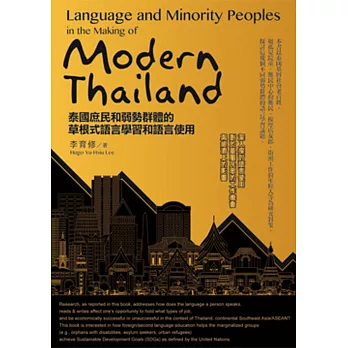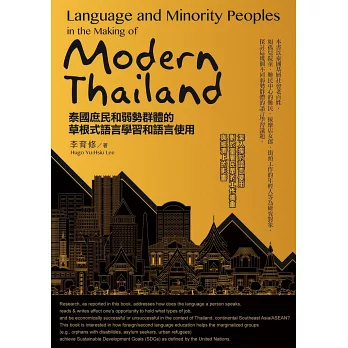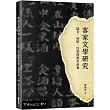推薦序
1. 洪銘謙/台灣泰國交流協會秘書長
李育修以一位在泰國生活的台灣人為出發點,撰寫出真實生活於當地才能體會的經驗。語言作為一個橋樑在任何地方都是不可或缺的條件,但語言並非只要講就代表能溝通,更需考量場所與情境的適用性。了解草根性語言可說是認識俗民文化的關鍵環節,更是台灣人前往泰國工作、旅遊、移民的最佳起手式。
相信李博士的著作定能幫助到更多現在或未來將前往 泰國的台灣人,使台灣與泰國間的交流能隨著使用合適的語言更加廣泛,並期盼讀者能夠過此書的閱讀拉近台灣與泰國間的友誼,達到真正的台泰交流。
2. 李三財/「就諦學堂」創辦人
前瞻東協!本人創立的「香港華僑陳就娣紀念中心」,自2012年六月開始和四方報合作推出「免費學東南亞七國語言計劃」,在台灣推廣東南亞的語言文化!
今天大家也可以透過李博士的文章,獨特的視角觀點,認識泰國的基層社會及庶民文化!更可對東協的崛起有更深入的了解!
3. Serafin M. Coronel‐Molina/美國社會語言學家
The social, linguistic, cultural, political, and economical reality of indigenous and minoritized people is changing by leaps and bounds around the world. The asymmetrical relationships of power, ideology, politics and economy are tremendous forces that cause a range of inequalities and injustices, and oppressions at all levels that end up increasing the gap between the haves and the have-nots.
Social phenomena such as war, famine, poverty, natural disasters, racial/ethnic cleansing, and political and religious persecutions can generate a host of displacements and diaspora movements (voluntary and involuntary migrations). Lack of opportunities for education and good health can also initiate waves of migration worldwide.
When people immigrate to a new social and physical space, they have to face the new ways of being, seeing, knowing and experiencing the world. This situation becomes even more challenging when linguistic differences are added to the cultural. For instance,
"many minorities do not possess sufficient political, economic, social or linguistic capital vis-à-vis the dominant, privileged sectors of society.
This reality puts the minority population at a disadvantage and creates some stumbling blocks in their quest to achieve linguistic inclusion and social justice.
These excluded populations are condemned to live on the margins or peripheries of society. "
In this sense, this volume entitled Language and Minority in the Making of Thailand by Hugo Yu-Hsiu Lee, constitutes a singular contribution that explores issues such as language poverty, language and economy, and language and development from an interdisciplinary perspective. The book is composed of seven chapters, with a primary focus on the relationship between foreign- and second-language teaching and learning, bilingualism and individual multilingualism, and the struggles of minority populations to integrate into the mainstream society of Thailand. The book also links economic disadvantages to educational disadvantages from sociolinguistic and ecological perspectives. In other words, it provides past and present accounts of the strategic bi- and multilingual language use of minorities such as orphans with disabilities, bar girls, asylum seekers, migrant workers and urban refugees in Bangkok.
In a nutshell, Language and Minority in the Making of Thailand encapsulates fundamental debates on language, inequality, poverty, education, economy and development. The insightful content of this book discusses pivotal topics in sociolinguistics, linguistic anthropology and applied linguistics in relation to linguistic and political economy, using linguistic ethnography as the methodology. It will be a compelling and useful read for anyone interested in language rights and language practices in contact situations, in this part of the world or any other.
作者序
AS I AM writing and revising preface, the 74th session of United Nations, Economic and Social Commission for Asia and the Pacific (held from 11 - 16 May 2018 at the United Nations Conference Center, Bangkok), is now in full swing to address the issue of inequality (Theme Topic: Inequality in the era of the 2030 Agenda for Sustainable Development). Discussions about information and communication technology, environment, economics, financing, trade, investment, transport, energy are held among United Nations senior officials and ministerial representatives during the 74th Commission.
Nonetheless, inequality of opportunity to access basic education rights, services and resources such as suitable learning materials, pedagogy and teaching methods required for individuals and groups to communicate with foreign customers and trade partners from other countries is not addressed by the United Nations. The cost of ignoring inequality of opportunity to learn globally dominant, foreign and second languages is significant.
The book finds that inequality is on the rise in Thailand and unequal access to opportunities such as foreign and second language learning (particularly dominant-language learning opportunities) has left enormous marginalized individuals and groups behind, resulting in widen inequalities of outcomes, particularly in income.
The book also finds that to converse in a foreign/second language is closely associated with opportunity and power to increase income. This is particularly true for the urban poor and those who work in the service industry.
There is a growing recognition that strategic bi-/multilingualism in individual and group levels is good to boost economic growth. Research (as reported in the book) demonstrate that marginalized individuals and groups with high access rates to dominant, foreign, second language learning opportunities have lower poverty rates.
In other words, minority peoples who actively foster foreign/second language learning gain more rewards in their workforce.
Access to humanitarian-based language-support programs and informal foreign/second language learning resources is crucial for achieving sustainable development goals (SDGs) for different groups of minority peoples by helping reduce and combat poverty, increase employment opportunity and advance formal and informal education. In the last decade, language solutions to social problems have not yet become a central focus of research, development planning and implementation of plans by the United Nations and civil society leaders.
However, language solutions to social problems are essential to help realize United Nations’ SDGs. Micro language planning, precision language education, informal language learning, competent and strategic bi-/multilingualism, for instance, help reduce poverty (SDG1) and reduce inequality (SDG10), support the development of education (SDG4) and industry (SDG9), and ultimately boost economic growth (SDG8).



 天天爆殺
天天爆殺  今日66折
今日66折 
























 博客來
博客來 博客來
博客來 博客來
博客來 博客來
博客來 博客來
博客來